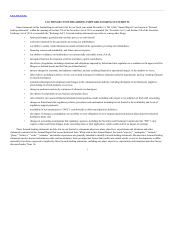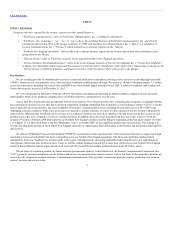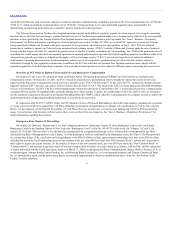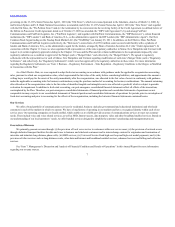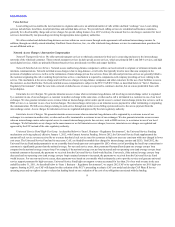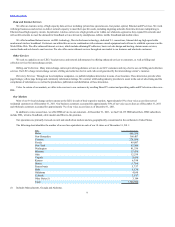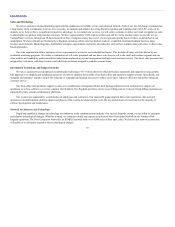FairPoint Communications 2011 Annual Report Download - page 14
Download and view the complete annual report
Please find page 14 of the 2011 FairPoint Communications annual report below. You can navigate through the pages in the report by either clicking on the pages listed below, or by using the keyword search tool below to find specific information within the annual report.
Table of Contents
more detail below, the FCC has issued a major order addressing universal service funding and intercarrier compensation and has announced its intentions to
undertake other significant regulatory activity including the methodology for contributing to universal service funding. In addition, the FCC has a number of
universal services and intercarrier compensation issues under consideration in a Further Notice of Proposed Rulemaking. We cannot predict the outcome of
these proceedings or the effect the resulting decisions may have on our business.
Overview of FCC Order to Reform Universal Service and Intercarrier Compensation
On October 27, 2011, the FCC adopted an Order and Further Notice of Proposed Rulemaking on Universal Service and Intercarrier Compensation
reform. On November 18, 2011, the FCC released the FCC CAF/ICC Order. In this order, the FCC replaced all existing USF for price cap carriers with its
CAF. The intent of the CAF is to bring high speed affordable broadband services to all Americans. The FCC CAF/ICC Order fundamentally reforms the ICC
system that governs how communications companies bill one another for handling traffic, gradually phasing down these charges. Together, the modifications
to the CAF and ICC rules are intended to benefit consumers and promote the goals of the NBP, which called for overhauling these two complex systems to
address the modern-day mission of supporting broadband deployment as cost-effectively as possible.
In conjunction with the FCC CAF/ICC Order, the FCC adopted a NPRM to deal with related matters, including but not limited to: (i) the actual cost
model to be adopted for CAF Phase II funding, (ii) treatment of originating access charges, (iii) modifications to CAF for rate-of-return ILECs,
(iv) development of CAF Phase II for Mobility, (v) CAF Phase II reverse auction rules, (vi) remote areas funding and (vii) IP to IP interconnection issues. It is
not known what decisions will be made on these issues or how they may impact us.
FCC CAF Phase I Overview
Under the new rules adopted in the FCC CAF/ICC Order, all of our rural operations will be treated under the CAF rules for price cap carriers. Under
those rules, all of our ILEC operations will receive CAF Phase I frozen support funding in 2012 that is equal to all forms of high cost universal service
funding received during 2011. We may also be eligible in 2012 for the one-time CAF Phase I Incremental Support, which would include a portion of a
nationwide funding pool in the amount of $300 million that is being made available to price cap ILECs based on a cost regression run of the High Cost Proxy
Model used, through 2011, to establish High Cost Model Support for non-rural ILECs. It is not clear at this time how much, if any, of this funding will be
made available to us, nor is it clear whether we will be able to accept any or all of the potential funding, given the restrictions placed on the CAF Phase I
Incremental Support by the new rules adopted by the FCC. Various companies and industry associations are seeking reconsideration of the new CAF rules
and it is not known whether the FCC will modify its rules or what impact any such modifications may have on us.
FCC CAF Phase II Overview
Under the new FCC rules, the FCC intends to adopt a new cost model during 2012 that will be used to establish Phase II CAF funding effective
January 1, 2013. The nature and timing of the model adopted are subject to regulatory and legal processes and the exact nature of the model and the timing of
its implementation are not known at this time. Under the new rules, the FCC intends to establish CAF funding for geographic areas defined by the Census
Bureau that contain approximately 400 households (“Census Blocks”) that have no unsubsidized competition. In effect, we expect the FCC to identify specific
Census Blocks in our operating territories, identify a five year funding commitment, identify specific service obligations, and offer the funding to us, as a
price cap ILEC, on a “right of first refusal” basis. If we accept the funding we will be obligated to provide service to all customer locations in the specified
Census Blocks by the end of the five years and offer broadband services with minimum speeds of 4 megabit per second (“MBPS”) service down (to the
customer) and 1 MBPS service up (from the customer to the Internet). There will also be additional obligations, including but not limited to latency and rates.
In the event we choose not to exercise our right of first refusal for CAF Phase II funding, the FCC intends to use reverse auctions to allow carriers to bid for the
funding. At this point, the specific Census Blocks which will be included in CAF Phase II have not been identified, and the cost model has not been adopted.
Accordingly, we do not know how much funding will be offered for each of our operations and we do not know whether we will accept funding for any or all
of our operating areas. CAF Phase II funding will be offered based on all “study areas” in a state operation operated by each ILEC.
13


